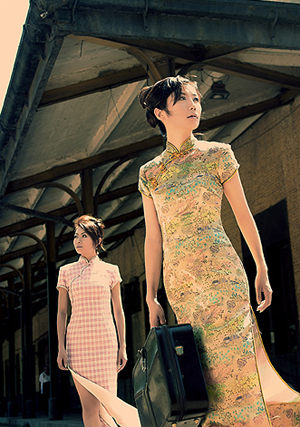The Allure of the 1930s Cheongsam
The 1930s Cheongsam, a symbol of elegance and sophistication, has captivated the world with its unique charm. This traditional Chinese dress, with its distinctive high collar, slits, and fitted silhouette, has not only become a fashion icon but also a testament to the cultural heritage of the East. The revival of the 1930s Cheongsam fashion is more than just a trend; it is a celebration of the rich history and artistry that has been cherished for decades.

Evolution of the Cheongsam
The evolution of the Cheongsam from a loose, traditional Manchu robe to the more form-fitting and stylish dress we know today is a fascinating journey. According to Wikipedia, the Cheongsam underwent significant changes in the 1920s and 1930s, influenced by Western fashion. This transformation was not only a reflection of the changing times but also a sign of the growing confidence and modernity of Chinese women.
Cultural Significance
The Cheongsam is more than a garment; it is a cultural symbol. It represents the fusion of traditional Chinese values with modern influences. As stated by renowned fashion historian John S. Major, “The Cheongsam is a perfect example of how fashion can serve as a bridge between the past and the present, between different cultures.” This cultural significance is a key reason for the revival of the 1930s Cheongsam fashion.

Fashion and Femininity
The 1930s Cheongsam is a symbol of femininity and grace. Its design highlights the natural curves of the female form, embodying the essence of elegance. As Madame Chiang Kai-shek, a prominent figure of the era, once said, “The Cheongsam is the embodiment of Chinese womanhood, a symbol of our strength and beauty.” This statement underscores the profound impact of the Cheongsam on the perception of femininity in the 1930s and beyond.
Revival and Modern Interpretation
The revival of the 1930s Cheongsam fashion is not a mere replication of the past; it is a modern reinterpretation that breathes new life into the classic design. Today’s designers are infusing the Cheongsam with contemporary elements, making it relevant to the fashion-forward individuals of the 21st century. As Vivienne Tam, a renowned fashion designer, explains, “The Cheongsam is a canvas for creativity, a platform for expressing the fusion of East and West.”

Global Appeal
The 1930s Cheongsam has transcended geographical boundaries, becoming a global fashion phenomenon. Its allure is not limited to the East; it has captured the hearts of fashion enthusiasts worldwide. As Suzy Menkes, a leading fashion journalist, notes, “The Cheongsam is a testament to the universal appeal of beauty and style, transcending cultural and geographical barriers.” This global appeal is a testament to the timeless elegance of the 1930s Cheongsam.

Conclusion
The 1930s Cheongsam fashion revival is a celebration of the past and a step towards the future. It is a reflection of the enduring appeal of this iconic dress and its ability to adapt and evolve with the changing times. As we continue to explore and reinterpret the Cheongsam, we honor the legacy of this timeless garment and embrace its relevance in the modern world.








I’m a fashion enthusiast from Rio de Janeiro, and I’ve been fascinated by the Cheongsam’s global appeal. The article’s mention of its timeless elegance is accurate. It’s a garment that transcends geographical and cultural boundaries.
I’m a 40-year-old businesswoman from Hong Kong, and I’ve always felt confident in a Cheongsam. The article’s mention of its cultural significance is accurate. It’s not just a dress; it’s a symbol of strength and beauty.
As a fashion critic, I appreciate the article’s balanced view of the Cheongsam’s revival. It’s not just about nostalgia; it’s about innovation. The modern interpretations of this classic garment are a testament to its enduring appeal.
As a fashion enthusiast from Paris, I find the 1930s Cheongsam revival absolutely mesmerizing. The blend of traditional Chinese aesthetics with modern fashion elements is a testament to the universal appeal of beauty. The high collar and fitted silhouette not only highlight femininity but also exude a sense of sophistication that is timeless.
I’m a 30-year-old Chinese woman living in New York, and I’ve always been fascinated by the Cheongsam. The article beautifully captures the cultural significance of this garment. It’s not just about fashion; it’s about heritage and identity. Wearing a Cheongsam makes me feel connected to my roots, even in a foreign land.
As a fashion historian, I appreciate the article’s detailed account of the Cheongsam’s evolution. It’s a fascinating journey from a traditional robe to a modern dress. The revival of this garment is a celebration of both history and innovation.